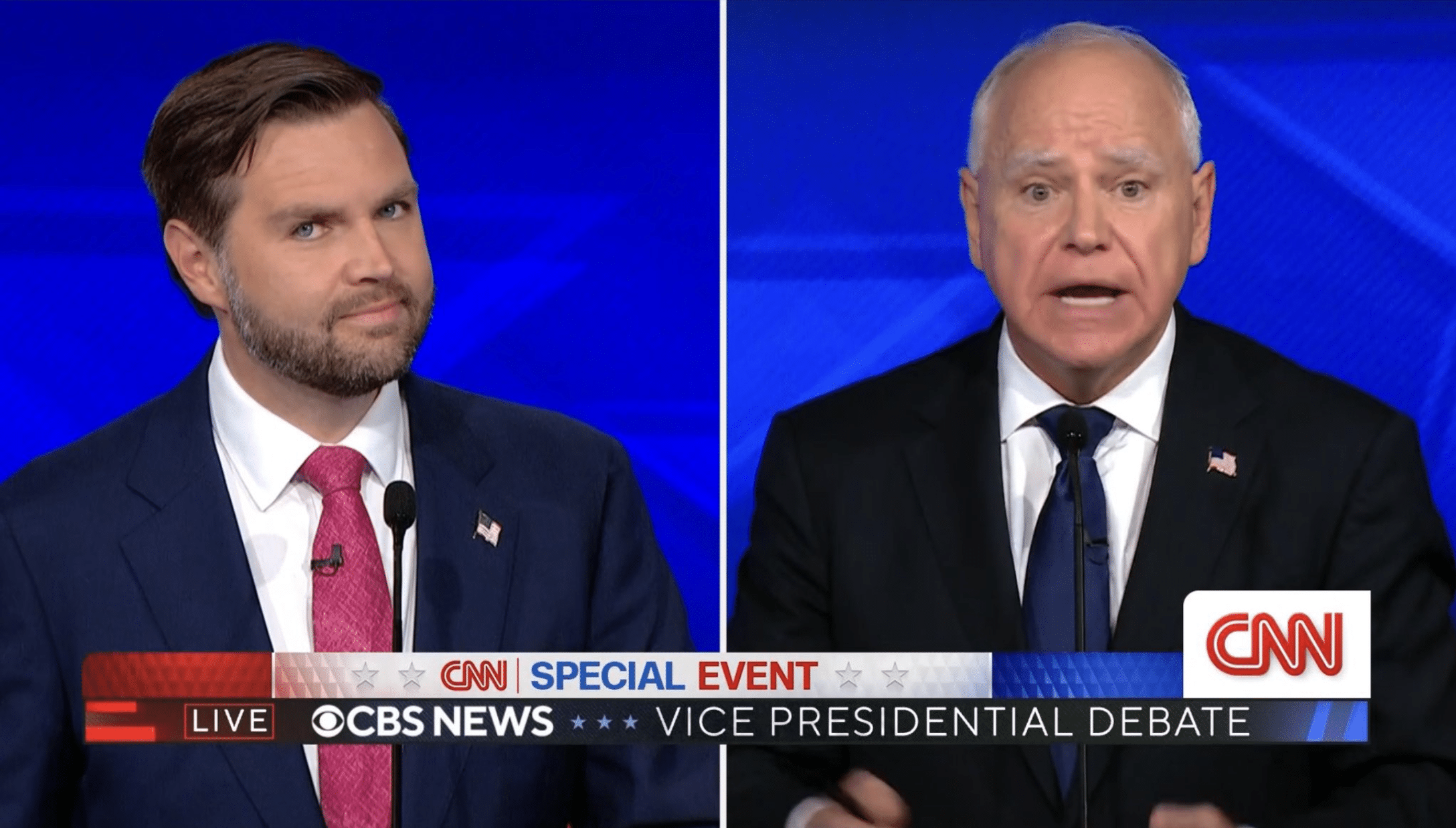Tuesday night was the final debate before the November election, and it was the first time a significant number of Americans were formally introduced to the vice-presidential nominees, Ohio Senator J.D. Vance and Minnesota Governor Tim Walz.
Like me, Vance was a U.S. Marine; there’s still some comradery there. (OORAH!)
In 2005, Vance deployed to Iraq for six months as a military journalist. He departed right before I began my eighteen-month combat tour in Afghanistan.
My deployment was as a member of the Idaho Army National Guard. Walz served in the National Guard for twenty-four years, retiring just before his unit was deployed to Iraq. And contrary to his multiple statements otherwise, Walz has never been in a warzone.
I wish CBS had provided more time for each man to speak on foreign policy at length. But absent the opening question, spurred by the confrontation between Israel and Iran earlier this week, everything else (including Ukraine!) went unmentioned.
But maybe that’s for the best. It’s apparent from the framing of the first question—”Would you support or oppose a preemptive strike by Israel on Iran?”—that the media’s mouths are watering for blood.
I have a lot to say on what’s happening in the Middle East, but suffice to say for now that Iran is not a threat to the United States. Iran could be a threat to the thousands of American soldiers fighting an endless war in Iraq and Syria, or permanently stationed as a fixture of empire in Qatar, and that’s a contributing reason we must bring our troops home.
But the territorial integrity and national security of our country is infinitely more threatened by a migrant invasion across our open southern border and a $35 trillion national debt than it is by the Ayatollah.
Walz responded to the question by criticizing Donald Trump for not striking Iran during his first term. Vance responded by saying Israel is in the driver’s seat and deference should be given to their decision.
With little information given last night, let’s look at their public records.
Vance has written that George W. Bush sent Republican voters’ “children on a bloody misadventure,” and that America’s wars had left “a Middle East that is humiliatingly worse off than the way we found it.”
Only 40-years old, he wants a renewed conservative movement for the twenty-first century equipped with “a foreign policy…built around fiercely securing and defending America’s national interests, but not sacrificing so many of the people that I served with to imperial hubris.”
And since being elected to the U.S. Senate in 2022, Vance has been one of the most earnest opponents of continued foreign aid to Ukraine and involvement in war against Russia, and instead favors a sensible, negotiated peace in Eastern Europe.
As a backbencher in the U.S. House, Walz supported AUMF reform but never stood up as a champion on the issue. And as governor of Minnesota, he never lifted a finger to support the Defend the Guard legislation that Bring Our Troops Home introduced with the help of State Senator Nathan Wesenberg.
One of these men can coherently explain America’s place in the world and what should be her priorities, and says explicitly that they don’t include nation-building or endless war in the Middle East. The other inflates his military record, and bumbles along on a national ticket that’s adopted Dick Cheney’s foreign policy.
One final note that I need to address. Bring Our Troops Home tries very hard to get our America First message out into the public square. That can be difficult when Big Tech, aligned with the Pentagon and military contractors, artificially suppresses our reach.
We rely on the First Amendment to avoid being crushed outright by the War Party. But Tim Walz opposes freedom of speech outright.
He acknowledged during the debate that he doesn’t believe the First Amendment permits “disinformation” (whatever that is) or “hate speech” and that both should be criminalized. I wonder how long until my criticisms of the CEO of Lockheed Martin are penalized as being “too hateful.”
Walz cited the Supreme Court decision Schenck v. United States, which imprisoned Americans for protesting against the draft during World War I using the Espionage Act, the same law used to prosecute Julian Assange for journalism. That decision was rightly overturned by the Court in 1971.
Walz’s opposition to freedom of speech (and the Bill of Rights at-large) is radical, unAmerican, and in service of the DC War Party.
The Defend the Guard movement is the most important cause in the United States. We cannot allow it to die for lack of effort, or be smothered by government censorship like what Tim Walz favors.
Libertarians worth their salt must act to bring our troops home before the Middle East really explodes.

































